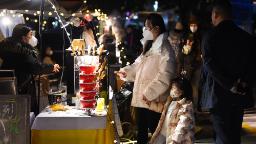
Hong Kong
CNN
—
The sprawling Chinese metropolis of Chongqing announced Sunday that public sector employees testing positive for Covid-19 can go to work “as normal,” a remarkable turnaround for a city that only weeks ago had been in the throes of a mass lockdown.
The move comes as China continues to quickly unravel its once-stringent zero-Covid policy, with local governments across the nation relaxing costly rules around testing, quarantine and other pandemic policies amid a widespread economic downturn.
“Asymptomatic and mildly ill employees of the (Communist Party) and government organizations at all levels, enterprises and institutions can go to work normally after taking protective measures as necessary for their health status and job requirements,” the Chongqing pandemic response office said in a statement published on the municipal government’s website.
It added that government agencies would no longer check employees – including police, public school teachers and other workers – for daily negative Covid tests. Instead, authorities will shift the focus of work from preventing infection to health protection and preventing severe disease, it said.
The abrupt U-turn is especially stunning in Chongqing, one of China’s largest cities, with 32 million residents and annual GDP of $400 billion.
Jerry Cheng, who works at a state-owned construction company in the city and is currently Covid positive, voiced concerns about the announcement.
“I won’t go unless they call my name,” he told CNN. “It’s definitely not a good thing to have a group of infected people working together,” he said, adding the new policy was to protect the local economy.
Cheng’s anxiety was reflected on Weibo, China’s version of Twitter, on Monday as Chongqing residents reacted to the announcement.
“Why do you need to go and infect healthy people?” read one top comment. Another user wrote: “This is going from one extreme to the other.”
Several other places in China, including the eastern city of Wuhu and the province of Zhejiang, also announced similar measures this week.
Chongqing, a hub for industry and agriculture, became a Covid hotspot last month. More than a million residents were told not to leave the city unless absolutely necessary, and several rounds of daily mass testing were rolled out.
When China’s Vice Premier Sun Chunlan visited Chongqing on November 22, she urged local authorities to take “swift and decisive measures” to contain the outbreak by identifying positive cases and their close contacts, according to state-run outlet Global Times.
But by then, some residents were losing patience. Three years of zero-Covid had taken its toll on the economy, disrupting daily life and people’s livelihoods.
Photos from Chongqing had gone viral online in August, showing huge crowds standing under the sun for hours during a record heat wave as they waited for mandatory Covid tests. In the background, plumes of smoke from wildfires rose above the skyline.
Reflecting the growing frustration, one Chongqing resident delivered a searing speech in late November criticizing the lockdown of his residential compound, shouting to a cheering crowd: “Without freedom, I would rather die!”
Nationwide protests against the zero-Covid policy – and in some cases, against the central leadership itself – broke out just days later, marking the most significant challenge to the Communist Party and Chinese leader Xi Jinping in decades.
The country’s rapid rollback of Covid restrictions came soon after. And while the easing of rules, such as allowing Covid patients to isolate at home instead of being taken to a government quarantine center, is a long-awaited relief for many, skyrocketing cases have also prompted widespread anxiety among a population that had been largely shielded from the virus since 2020.
According to CNN calculations based on a study from Hong Kong researchers released last week, the country’s Covid death toll could reach almost one million over the course of its reopening.

